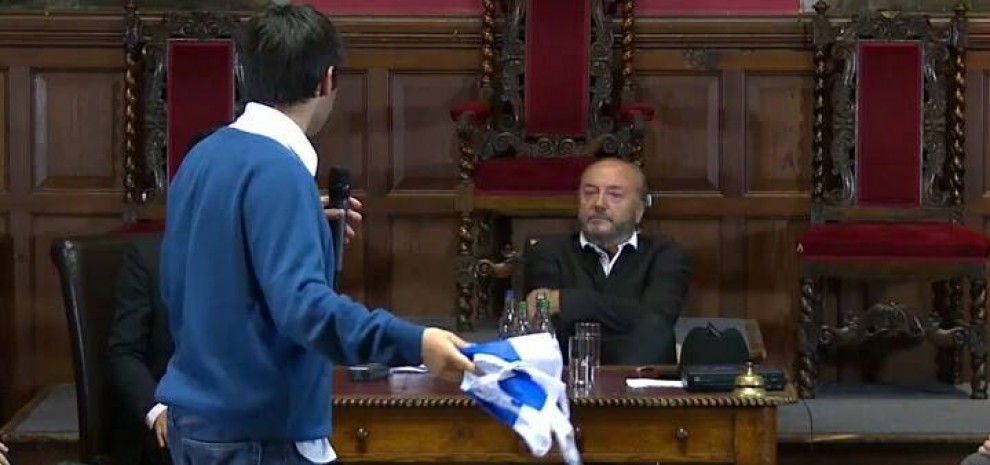By Daniel Marks
Ehud Banai, aged 60, is an important Israeli singer and songwriter. Born of the aristocratic Jerusalem Banai family he has recently become more religious, or traditional as it is often called in Israel. Despite this spiritual shift his political views are still generally considered to be left of centre.
This Succot, the Jewish festival of Tabernacles, Banai initially agreed to appear in the Judean settlement of Susya in South Hebron, but due to pressure from the Israeli left announced that he would cancel. However, after pressure from the Israeli right he finally announced that he would sing at Susya afterall.
I’m no great lover of music and rarely attend such gatherings, but on Sunday night I decided to attend. I wanted the concert to be a success and I reasoned that if any rowdy right wingers were to boo or heckle Banai, I’d be just the man to shut them up.
More importantly my daughter Rachelle is serving five minutes from Susya as part of her officers’ course and it would be a chance to bring her some home-cooked food and meet her friends. My sister, who lives ten minutes from Susya, invited us for a barbeque lunch in between seeing Rachelle and going to the concert.
All in all, it seemed too good an opportunity to miss. So, late Sunday morning we set off southwards.
We were pleased to see Rachelle. She told us that left wing demonstrators had been protesting near to the tiny settlement in which they were stationed. Apparently, the IDF’s main worry was what hot-headed settlers might do to these poor European anarchists.
Over lunch nobody spoke about politics. Truthfully, everything there is to say has been said so many times. Instead, it was all about family matters, gossip and advice for my niece who soon leaves for three years in Italy as an Israeli emissary and teacher. Her sister, who has waited for a child for nine years and has known so many disappointments, was there looking delightfully fat and pregnant. Please G-d.
It is now 7.15pm and we enter Susya. Shouts of “Free Palestine!” greet us and upset the festive atmosphere. I have heard something similar many times on clips on this excellent blog, but never live. They seem to be out of tune chanting “Free Pales-tine!” rather than the usual and much more melodious “Free Free Pal-es-tine!”.
Every fibre of my being wants to stop the car, get out and ask them why in this sea of madness that we call the Middle East the focus of their protests were always against this one tiny island of sanity, democracy and human rights.
“So, what would you say to them?” challenged my son. “What would you say?”
“Maybe I’d ask them why they don’t drive another 150 miles north and demonstrate against genocide” I replied.
“Yes, but they can’t go to Syria” retorted Ariel, “They would be torn to shreds by both sides.”
Ariel is right. There is very little point in trying to persuade those who believe in the concept of a “Higher Truth”. You can argue yourselves blue in the face citing historical facts, international law and just common sense, but they’ll just wait for you to finish and then repeat yet another tired cliché about apartheid or colonialism or worse.
And, anyway, the IDF were desperately putting every effort into protecting those wretched anarchists and wouldn’t have let me near them.
We arrive at the outdoor concert area after stopping briefly to taste some excellent, but over-priced Hebron wine. It has a similar taste to the Palestinian grapes that we purchased along the way. There are no seats though the wise have brought plastic chairs with them. We are about a dozen sharing two small blankets that do little to protect us from the sharp pebbles. There are to be two singers, Boaz Sharabi and Banai.
Sharabi and the organizers also seem worried that members of the audience might boo or heckle Banai because of his original cancellation. Sharabi inserts into his impressive performance a moving plea to receive his friend warmly. In the event there is little to worry about as the feast of tabernacles is traditionally a time of joy and Banai is cheered.
I may be there for political reasons, but clearly most are just out to have a good time, and who can blame them?
On the way home we hear that a Palestinian sniper has shot and killed a soldier in Hebron. Roxana, my wife, is worried that it might be one of Rachelle’s brothers in arms. However, it transpires that it was 20-year-old Gal (Gabriel) Kobi who served in another unit.
There is no reason to feel relief. Gal’s blood was no less red than the soldiers who are serving with Rachelle and he too had friends and family who loved him. He was a complete world and had plans and dreams and a potential that will never be realized because of the bullet of a coward with a sniper’s rifle.
I call Rachelle one last time on our way home and, as is traditional in Judaism, we part with a word of Torah. The story is told of a Jewish man who sits in his tabernacle with his young daughter one stormy night. The winds rock the shack and blow out some of the candles and his daughter asks, “Father, what will happen? Will our tabernacle fall down?” Her father smiles and strokes her head, “Don’t worry,” he answers, “This tabernacle has been standing for 3,000 years.”
And that is the truth. Perhaps that is what I should have told those anarchists.
Daniel Marks, a teacher, lives in Ma’ale Adumim on the West Bank.



